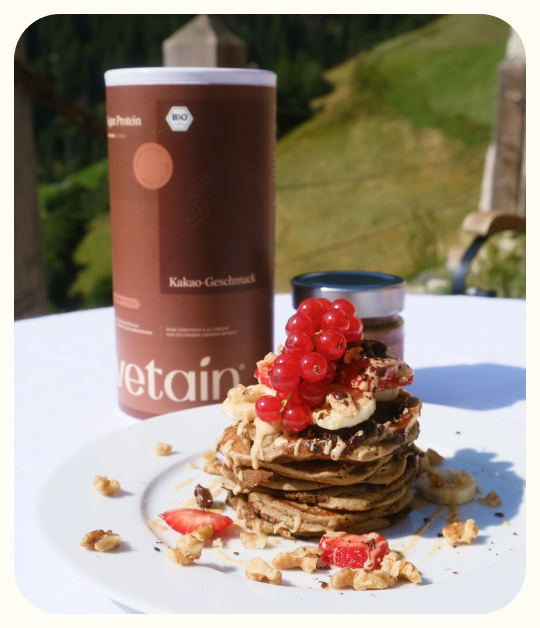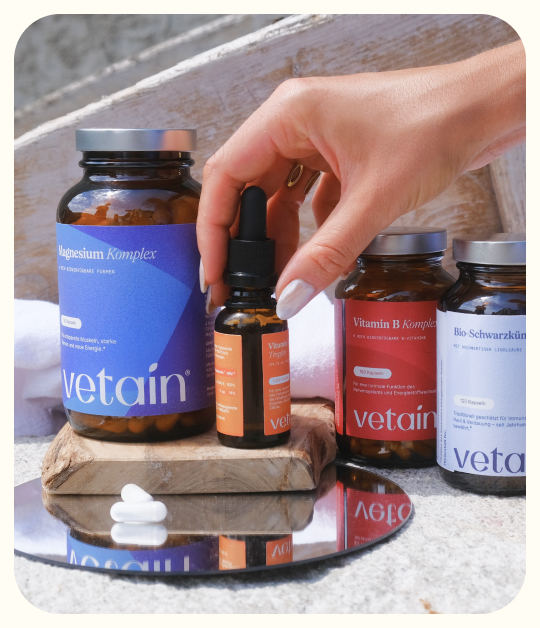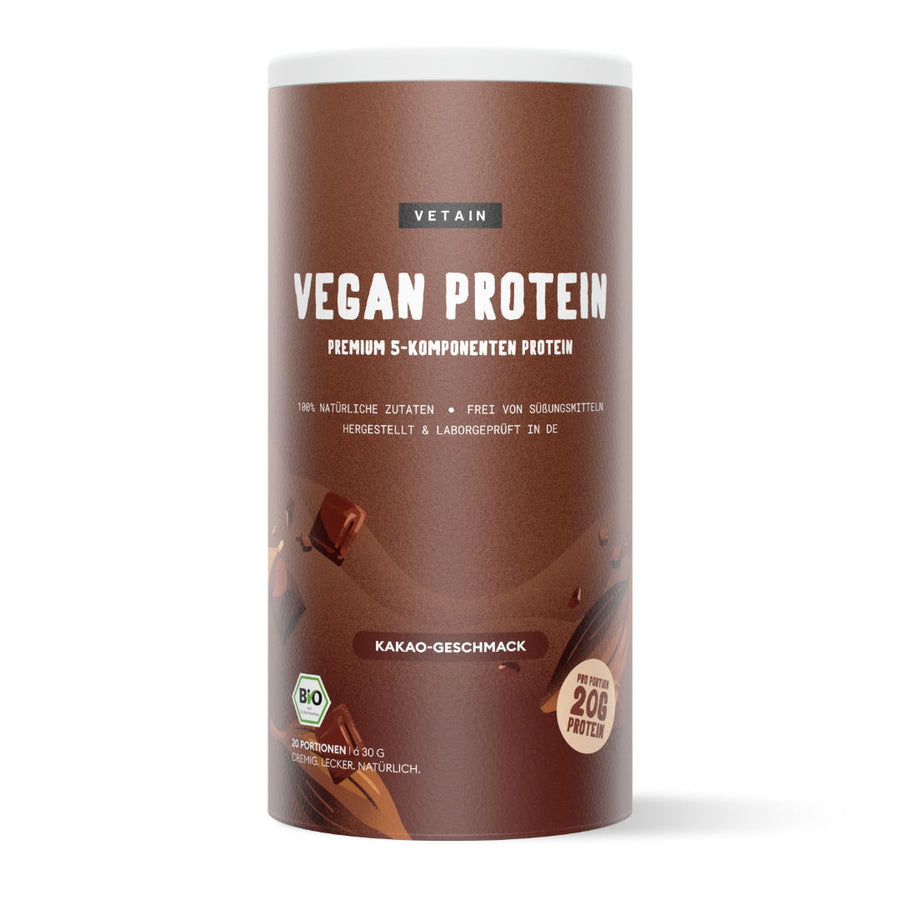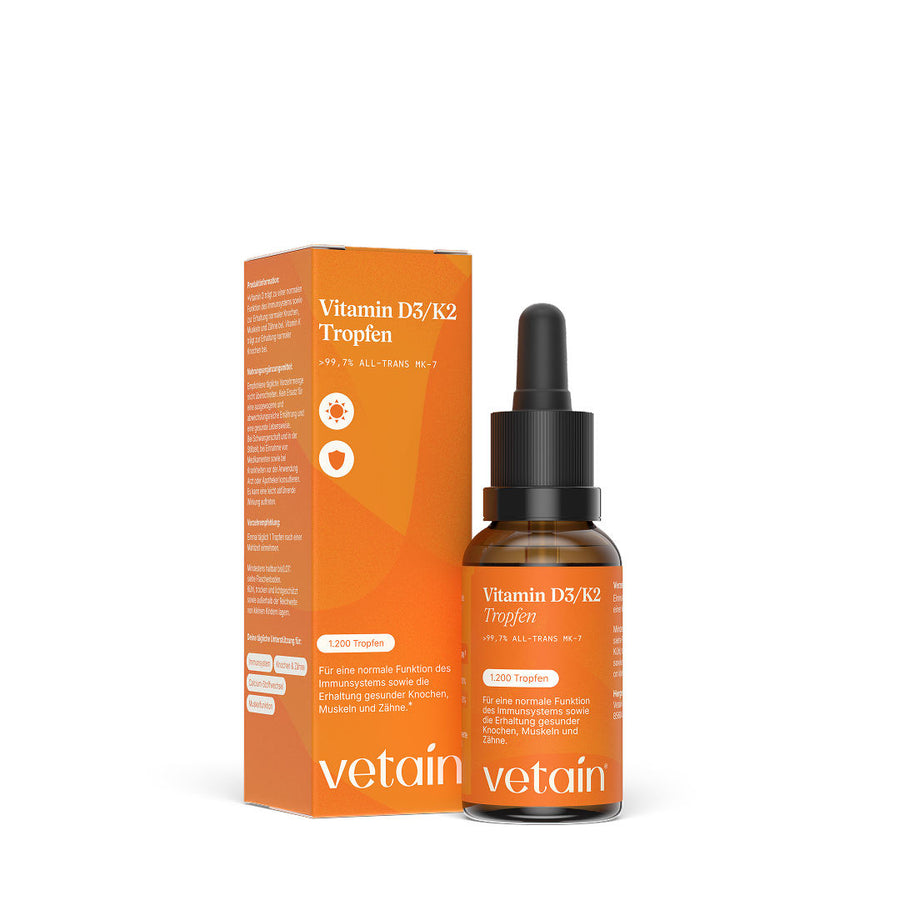“Do some sport,” they said, “you’ll feel fantastic afterward!” What they didn’t tell you? That for the next few days you might barely be able to move because of sore muscles, and even walking to the fridge feels like a marathon.
Since you’re reading this article right now, you’re probably in exactly that situation and desperately wondering: What helps quickly against muscle soreness?
Don’t worry — we at Vetain have the answers! In this article, we’ll show you the best remedies for muscle aches and explain how to get rid of sore muscles. With our tips and tricks, you’ll be back on your feet in no time!
To make sure we’re on the same page, let’s briefly go back to basics:
What is muscle soreness, and how does it develop?
Before we talk about what helps against muscle soreness, let’s look at how it arises. When we train — especially with new or particularly strenuous exercises — our muscles can become overloaded and develop microscopic tears. These tears need to heal. During healing, inflammation occurs and various repair mechanisms kick in — that’s what causes the pain you feel hours to days after training.
Here’s a common question answered right away: Is muscle soreness “good”? Well, not really. It simply shows that your body is responding to stress and building muscle. But that can happen without soreness, too! If you train effectively, increase the load gradually, give your body enough recovery time, and fuel it with quality nutrients, you can build muscle just as well — without pain. Muscle soreness shouldn’t be your benchmark for training success! Too much soreness can also signal overtraining and that your body is overwhelmed. Having it now and then isn’t a big deal, but you shouldn’t train with the goal of getting sore — that won’t do you any favors in the long run!
If you’re interested in the topic and want to learn more about how soreness develops, we recommend this article from us.
You probably suspected it: unfortunately, there’s no miracle cure for sore muscles. The “injury” — like a small scratch on your skin — simply has to heal, and that takes time. The best remedy against muscle soreness is to prevent it in the first place. There are, in fact, several ways to prevent the pain. And even if “prevention” sounds a bit boring, simple, quick strategies can go a long way so you won’t have to ask what helps against muscle soreness next time.
So how can you avoid it?
Preventing muscle soreness — here’s how
Want to know what really helps against sore muscles? Prevention. There’s a lot you can do to protect yourself and your muscles! A key rule: give your body time to adapt to new movements and exercises. Most soreness happens because we try to do too much too soon. Don’t go from 0 to 100 — increase gradually and step by step. That way, your muscles aren’t overwhelmed and can adapt to the load over time.
Before you start your workout, it’s also important to warm up properly to prepare your muscles. This can reduce the risk of overexertion and help prevent injuries. Perform your exercises with good form and schedule a relaxing cool-down afterward — your muscles will thank you.
Not to be overlooked: keep yourself generally fit (trained muscles get sore less often) and pay attention to your nutrition!
And now… drumroll… let’s finally get to what actually helps against sore muscles.
SOS: What helps against muscle soreness? The best home remedies and tips
So the damage is done — prevention won’t help you now. Everything hurts and you just want the soreness gone. What helps quickly against severe muscle soreness?
Here’s a list of DOs and DON’Ts to get you pain-free again soon:
DOs for muscle soreness
Heat: Heat in the form of warm baths, sauna sessions, or warm compresses (especially handy for sore quads!) promotes blood flow to the affected area. This supports healing of the micro-injuries. Heat also relaxes tight muscles, which will feel great.
Cold: Odd but true — besides heat, cold can help as well. Ideally right after training, but also later when soreness peaks, ice packs, cold showers, or cryotherapy sessions can help reduce swelling.
Rest: Your muscles need a break — and that includes good sleep. Intense training is off the table for now until you’re feeling better. Light, easy movement is still allowed and can even promote recovery. So, does exercise help against soreness? The honest answer: it depends! 😀
Sports balms and essential oils: These also stimulate circulation and can help similarly to heat applications. Peppermint and rosemary oils are particularly suitable and are common ingredients in sports balms. Make sure any oils you use are skin-safe!
Nutrition: Your diet plays a big role in what helps against soreness — more on that below.
Cold or heat — what to do for severe soreness?
So which one actually helps? The short answer: both can help relieve soreness. They work in different ways and support your muscles differently. A common recommendation is to use cold immediately after training and heat later when the pain sets in. Try it out and see what feels best. You can also combine both — contrast showers work well for many and are often very helpful!
Whether you choose to cool or warm your sore muscles is up to you.
DON’Ts for muscle soreness
Deep, intense massages: Strong massages can further irritate already stressed muscles — instead of relief, you may end up with even more and longer-lasting pain. Gentle massages, on the other hand, can be supportive and feel good.
Training through the pain: Soreness is your body’s clear signal that it needs rest and recovery. If you keep loading the affected muscles now, you risk true injuries and a much longer layoff.
No worries: you can still train other muscle groups — for example, if your quads are sore, go for an upper-body session. Just protect the sore area!
Stretching with soreness? Yes or no?
Opinions vary: some pros swear by stretching for prevention and treatment, others say it has no effect or may even be harmful!
The state of research? Not great. What’s clear is that intense or incorrect stretching isn’t helpful — it just stresses your already strained muscles. Makes sense, right? If you have a scratch on your hand, stretching that skin hurts more, too. At the same time, very gentle stretching can relax muscles and support recovery. Trust your body — do what feels good, and stop immediately if you feel pain!
Eat your way to relief — nutrition for muscle soreness
A good diet can’t completely prevent soreness, but it can make your body more resilient overall and may shorten muscle recovery time. In other words, nutrition can support you. Small spoiler: chocolate even makes the list of foods that can help!
So, what really helps?
Anti-inflammatory foods
Green vegetables and fruits like (tart) cherries or berries are very popular among active people.
Antioxidants such as vitamin C, vitamin E, and polyphenols
Red fruits (especially berries!), legumes, whole grains, and nuts are rich in antioxidants.
Proteins
Surprise! Protein supplies your muscles with amino acids — the building blocks of muscle. Sounds like the perfect time for a protein shake!
%-split_content-%
Carbohydrates
Carbs are always part of a varied diet — including for active people. Carbohydrates combined with protein are especially popular.
Supplements
A lot of research is ongoing here — for example, on how creatine, collagen, and robust vitamin D status might play a role in sports. We’ll keep you posted!
%-product_content-%
Extra tips
Cinnamon, ginger, and turmeric are true all-rounders and popular in performance-oriented diets. And don’t forget to drink enough water!
I know what you’re waiting for: yes, chocolate is actually a favorite! The real star here is the cocoa in chocolate — it contains lots of beneficial compounds. Opt for high-quality chocolate with a high cocoa content. And remember: enjoy in moderation, not excess.
One more important note: while healthy eating can help in the acute phase, it’s most effective when you eat well regularly. So treat your body to fruit and veggies more often — not just when you’re sore.
When it comes to “what helps against muscle soreness” — or better yet “what helps quickly against severe soreness” — magnesium is often mentioned. But what does the science say?
Does magnesium help with soreness? Here’s what science says
The research here isn’t crystal clear either. The current state of evidence suggests magnesium won’t instantly “cure” soreness — those tiny injuries still have to heal, and there’s no magic banana for that.
However, magnesium contributes to normal muscle function and electrolyte balance. So maintaining a good magnesium intake can’t hurt — include whole grains, nuts, and seeds in your diet regularly.
Speaking of nutrients: similar considerations apply to potassium, calcium, and iron. Optimal intake positively affects your muscles! Balanced nutrition isn’t just important for overall well-being — it also plays a significant role in sports.
In short: what helps against severe muscle soreness?
Above all, rest, heat and cold, light movement, and good nutrition help with the pain. Even better is preventing soreness from developing in the first place. Take good care of yourself — especially during training!
By the way: use your downtime to plan your first session after recovery. With our gym training plans, you can make your next workout gentler but just as effective!
Hopefully, you now know what helps against muscle soreness and how to best support your body during recovery. Get well soon!
Literatur & Quellen
- Dietger, M. (2022). Muskelkater. In: Dietger, M. (2022). Fit und gesund von 1 bis Hundert mit Ernährung und Bewegung. Aktuelles medizinisches Wissen zur Gesundheit. 5. Auflage.
- Heinrich, C. (2021). Muskelkater lindern und vorbeugen. https://www.apotheken-umschau.de/mein-koerper/muskeln/muskelkater-lindern-und-vorbeugen-712035.html#was-hilft-gegen-den-muskelkater
- Konopka, Dr. P. (2019). Muskelkater – Woher er kommt und was dagegen hilft. In: Gesundheit Ganz Groß, 31(1).
- Köhlmoos, S. & Tegtbur, Prof. Dr. U. (2023). Muskelkater: Was hilft gegen die Schmerzen? https://www.ndr.de/ratgeber/gesundheit/
Muskelkater-Was-hilft-gegen-die-Schmerzen,muskelkater101.html - Mosler, S. (2023). Regenerationsernährung. https://sportaerztezeitung.com/rubriken
/ernaehrung/2592/
regenerationsernaehrung/ - Pöttgen, Dr. med. K. (2019). Fokus Sporternährung. https://sportaerztezeitung.com/rubriken
/ernaehrung/3261/fokus-sporternaehrung/ - Tarsitano, M. G. et al. (2024). Effects of magnesium supplementation on muscle soreness in different type of physical activities: a systematic review. In: Journal Of Translational Medicine, 22(1).
Do you have questions? Feel free to email me — I’d love to hear from you! :)
Die in diesem Artikel geteilten Informationen ersetzen keine individuelle ärztliche oder ernährungswissenschaftliche Beratung.















 7 Min
7 Min
 Zuletzt aktualisiert am 07.01.2026
Zuletzt aktualisiert am 07.01.2026





